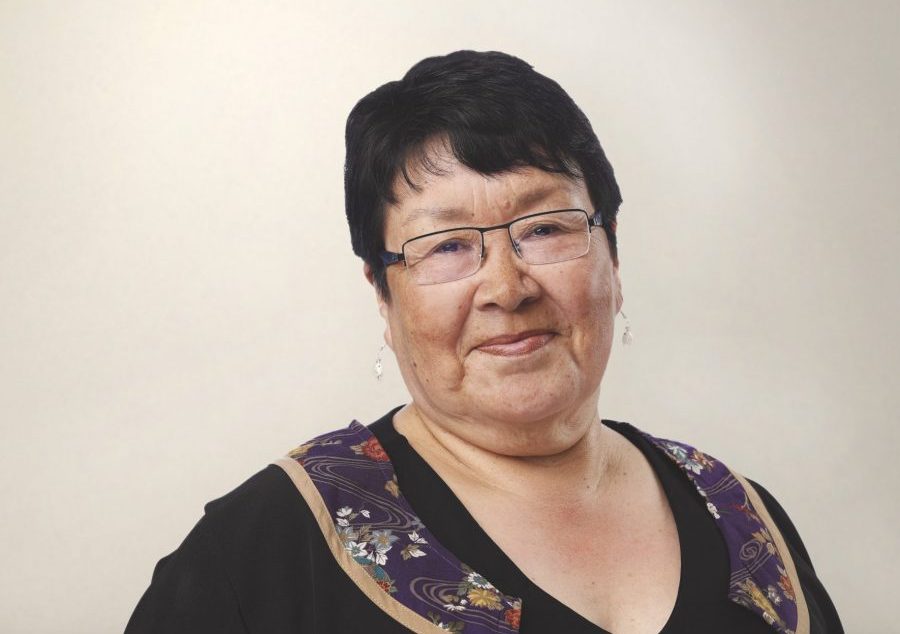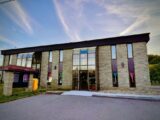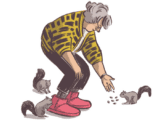Rebecca Kudloo is a powerhouse. Early last year, she had the RCMP agree to policy reform that would reduce violence against Inuit women and children — and she held the federal Liberal government to financing long-promised women’s shelters in Inuit Nunangat. She managed both by being steadily persistent.
Kudloo has been president of Pauktuutit Inuit Women of Canada since 2014. She was an adviser on the creation of the United Nations Declaration on the Rights of Indigenous Peoples. She worked for the Nunavut Department of Education and is a co-founder of Mianiqsijit, a counselling service responding to the residential school legacy of sexual abuse and family violence.
You may unsubscribe from any of our newsletters at any time.
She spoke with Julie McGonegal from her home in Baker Lake, Nunavut.
Julie McGonegal: Tell me about your childhood growing up on the land.
Rebecca Kudloo: I was born in a makeshift tent — on the beach, actually — on Baffin Island. I had a very happy childhood. We spent lots of time outdoors, moving camp and hunting, and I had brothers I could play with.
Then, at age nine, my parents were told that I had to go away to school in Igloolik. I didn’t know a word of English at the time. We learned about things like cows and farms — things we had never seen.
JM: In the late 1970s and early 1980s, a priest in Baker Lake sexually abused many children. In 2014, he was found guilty on dozens of related charges.
RK: That’s when I started wondering how we could help children in those situations. The Mianiqsijit Project was founded in 1986 in response to the priest’s abuse. We received funding to provide family therapists and child sexual abuse specialists from Edmonton for victims and their families.
But being from the south, those specialists didn’t know the community. There’s a high turnover rate of social workers and mental health workers.
With Mianiqsijit, we started doing community education on child sexual abuse and how victims are affected. Elders sometimes came to us sharing that they had been abused, too. Our volunteer board looked for start-up money for an office and counselling services. We expanded to all areas of family violence. We’ve been running for 35 years now.
JM: What challenges do you face in making these programs available?
RK: There’s a very high suicide rate up here. We’ve lost three young men in my community of Baker Lake. This affects everyone. You can’t distance yourself from it in a small community. We have to be careful how we do things. You can trigger somebody, and if you don’t have supports in place to help them, it’s not a good situation. We need multi-year funding for programs, like Mianiqsijit, that are successful. That said, we are a very resilient people.
JM: How are the issues facing the Inuit different from other Indigenous issues?
RK: We’re distinct culturally and linguistically. We don’t live on reserves. We’re isolated, living in fly-in, fly-out communities. That means we lack a lot of services that other communities have. For example, in Nunavut, there are only 14 shelters. In a small community, that means there’s nowhere for a woman to go. We live in extreme cold: 30 or 40 C below zero, sometimes 50 or 60 below. So when a woman needs to take her children away from an abusive partner, there is no safe place for her to go.
JM: According to statistics, Inuit women are 14 times more likely than other women in Canada to experience domestic violence. What’s behind that?
RK: A lot of it has to do with the fact that children were taken away to residential school and often abused physically and sexually. They came back to their communities very angry. I remember an Elder telling me that he had been abused at school and that I was the only person he had told. I have had long-distance calls from people in the High Arctic telling me about their abuse as a child. People are looking for someone to talk to, and the community-based counselling service that we have in Baker Lake needs to be available to all Inuit communities because it works.
JM: How does ignorance of Inuit culture affect political processes?
RK: During the National Inquiry into Missing and Murdered Indigenous Women and Girls, I had to constantly tell the commissioners that we’re different from First Nations people. At the hearings in Rankin Inlet, there was smudging, for example, and other Indigenous ceremonies that we don’t practise. Each family member who was present was also given an eagle feather, but eagle feathers don’t have any special meaning in Inuit culture. To know what is meaningful to us, they need to involve us in the process.
More on Broadview:
- At 1JustCity, Indigenous peoples — and settlers — come to heal in a safe space
- 4 Indigenous education courses to help fill in your knowledge gaps
- This former residential school is now a centre for reconciliation
JM: How much does language act as a barrier? Most politicians and professionals are not conversant in Inuktitut.
RK: If we need any specialized medical treatment in this region, we have to go to Winnipeg. Oftentimes, Elders will need to bring a relative to escort them and interpret for them. In Inuktitut, we don’t always have words for certain things; and just because you speak Inuktitut doesn’t mean you can interpret medical terms.
JM: How has COVID-19 affected you?
RK: All seven communities dispersed throughout this region must travel through the hub of Rankin Inlet to go to Winnipeg. For example, in September 2021, there was a positive case of COVID-19 on one of the flights to Rankin Inlet, which impacted multiple communities.
JM: In spite of these challenges, you remain hopeful. What is your vision for an Inuit future?
RK: One of the initiatives that I’m looking forward to is Pauktuutit’s shelter and transitional housing for Inuit women. Shelters are an important support when women are taking the first step in fleeing domestic violence and abuse. Transitional housing provides a safe place for women in their next steps to self-determination.
This interview has been edited and condensed for length and clarity. It first appeared in Broadview’s January/February 2022 issue with the title “Northern guardian.”
Julie McGonegal is an associate editor at Broadview.













